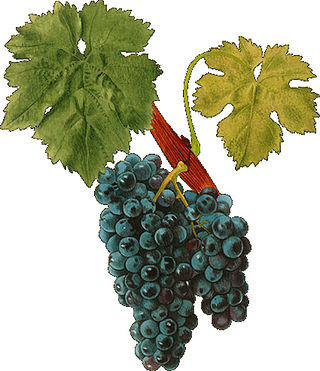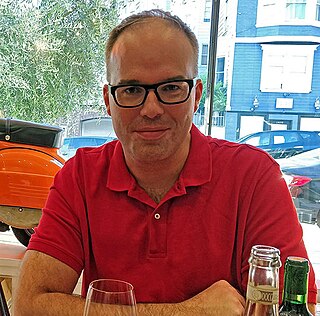
Priorat is a comarca (county) in Catalonia, Spain. The central part of the comarca, "Priorat històric," produces the highly regarded wines that are certified under the DOQ Priorat. Wines from elsewhere in the comarca are certified as DO Montsant although this region also has a small segment of the neighboring comarca, Ribera d'Ebre as well. However, galena mining was the main activity since prehistoric times until 1972, when the last galena mine closed.

Carignan is a red grape variety of Spanish origin that is more commonly found in French wine but is widely planted throughout the western Mediterranean and around the globe. Along with Aramon, it was considered one of the main grapes responsible for France's wine lake and was a substantial producer in jug wine production in California's Central Valley but in recent years, it has been reborn as a flagship wine for many cellars in the south of France as well as in Catalonia.

Grenache or Garnacha is one of the most widely planted red wine grape varieties in the world. It ripens late, so it needs hot, dry conditions such as those found in Spain, where the grape is believed originated. It is also grown in the Italian island of Sardinia, the south of France, Australia, and California's Monterey AVA, Paso Robles, and San Joaquin Valley.

Spanish wine includes red, white, and sparkling wines produced throughout the country. Located on the Iberian Peninsula, Spain has over 1.2 million hectares planted in wine grapes, making it the most widely planted wine-producing nation, but the second largest producer of wine in the world, behind Italy and ahead of France and the United States. This is due, in part, to the very low yields and wide spacing of the old vines planted on the dry soils found in some of the Spanish wine regions. The country is ninth in worldwide consumption with Spaniards drinking, on average, 21.6 litres per person a year. The country has an abundance of native grape varieties, with over 400 varieties planted throughout Spain, though 88 percent of the country's wine production is from only 20 grapes — including the reds Tempranillo, Bobal, Garnacha, and Monastrell; the whites Albariño, Airén, Verdejo, Palomino, and Macabeo; and the three Cava grapes Parellada, Xarel·lo, and Macabeo.

Cornudella de Montsant is a municipality in the comarca of the Priorat in Catalonia, Spain. It is situated in the north-west of the comarca below the Montsant range and the Prades Mountains. The Siurana reservoir is on the territory of the municipality and supplies its drinking water.

Enotourism, oenotourism, wine tourism, or vinitourism refers to tourism whose purpose is or includes the tasting, consumption or purchase of wine, often at or near the source. Where other types of tourism are often passive in nature, enotourism can consist of visits to wineries, tasting wines, vineyard walks, or even taking an active part in the harvest.

Empordà is a Spanish Denominación de Origen Protegida (DOP) for wines produced in the northeastern corner of Catalonia, Spain in the province of Girona.

Priorat is a Denominació d'Origen Qualificada (DOQ) for Catalan wines produced in the Priorat county, in the province of Tarragona, in the southwest of Catalonia.

Catalan wines are those that are produced in the wine regions of Catalonia. Occasionally, the appellation is applied to some French wine made in the Catalan region of Roussillon and neighboring areas, also known as Northern Catalonia or the Pays catalans. The city of Barcelona is the capital of Catalonia and despite not being in a wine region, it is the focal point of the Catalan wine industry: a primary consumer market, its port provides export functions and a source of financial resources and investment. The Penedès is the largest wine-making region in Catalonia.
Escanyavella is a white Catalan wine grape variety planted primarily in DOQ Priorat. The name literally translates from Catalan as "old lady strangler" and coughing is often a common reaction to those who eat the raw grapes. While grown in small numbers in Priorat, there are a number of wineries that use it as part of their blends and one that makes a wine completely from the grape although.
Croatian wine has a history dating back to the Ancient Greek settlers, and their wine production on the southern Dalmatian islands of Vis, Hvar and Korčula some 2,500 years ago. Like other old world wine producers, many traditional grape varieties still survive in Croatia, perfectly suited to their local wine hills. Modern wine-production methods have taken over in the larger wineries and EU-style wine regulations have been adopted, guaranteeing the quality of the wine.

Postup is wine growing region on Croatia's Pelješac peninsula just to the east of Orebić. It takes its name from the small village that sits at the center of it.
The Sadie Family is a South African producer of wine located in the Swartland region. Following the emergence of flagship wines Columella and Palladius, winemaker Eben Sadie has been described as an enfant terrible, South Africa's first certified celebrity winemaker, and by supporters as "one of the greatest and most original winemakers in the southern hemisphere". He has also branched out to other wine regions, such as in Spain.

Montsant is a Spanish Denominación de Origen Protegida (DOP) for wine located in the province of Tarragona and covers 12 municipalities. It was previously known as the Falset subzone of Tarragona (DO), and was created as a separate DO in the early 2000s. Regional approval came in 2001, and from 2002 wines were sold as Montsant rather than Tarragona. Montsant takes its name from the Montsant Mountains in the area.

Gratallops is a municipality in the comarca of the Priorat in Catalonia, Spain.

Celler Devinssi is a winery in the Priorat Qualified Designation of Origin, located in the town of Gratallops. It elaborates artisanally the following brands: Il·lia, Mas de les Valls, Cupatge and Rocapoll. The winery also offers adoption of grapevines as a form of advanced sale.

Dingač is a wine growing region on the Pelješac peninsula in the region of Dalmatia, Croatia. Situated on the southwestern facing slope of the Zabrada mountains between the small villages of Trstenik and Podobuče, it is a highly regarded area for growing the autochthonous Croatian red wine grape, Plavac Mali.

Clos Mogador produces estate bottled wines in Gratallops, Catalonia in the DOQ Priorat. Founded in 1979 by René Barbier III and his wife, Isabelle Meyer, the winery was part of a new wave of "Clos" wineries that released their first joint 1989 vintage to great acclaim. They have gone on to garner impressive scores by wine critics and have built up one of the most well-known brands in all of Priorat.

Miquel Hudin is an American-Croatian writer based in Catalonia, Spain. He created a series of wine travel books called, Vinologue in 2008. He additionally writes for his website, Hudin.com since its launch in 2011.
Bosnia and Herzegovina wine is wine made in the Balkan country of Bosnia and Herzegovina.
















